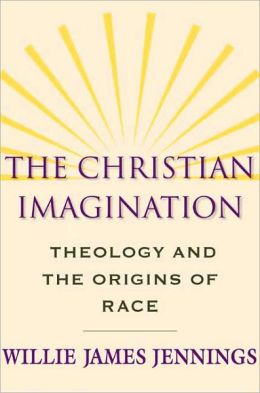Willie James Jennings, The Christian Imagination: Theology and the Origins of Race, reviewed by Amos Yong
 Willie James Jennings, The Christian Imagination: Theology and the Origins of Race (New Haven and London: Yale University Press, 2010). x + 366 pp.
Willie James Jennings, The Christian Imagination: Theology and the Origins of Race (New Haven and London: Yale University Press, 2010). x + 366 pp.
Jennings, former academic dean and now theology and black church studies professor at Duke Divinity School, tells the story of how our contemporary Christian imagination has become so deeply shaped by a racially divided understanding of the world—a world formed by the forces of modern colonialism. This racial imagination, in turn, has become the deformed lens through which we see “reality.” At one level, this is not a new thesis, although it is surprising how easy we forget this (almost like fish swimming in an ocean are oblivious to an alternative reality) even as it remains sadly true that many members of Jennings’ primary audience—Christian academics, scholars, theologians—still have not seriously grappled with the theological implications of this claim. Those of us in evangelical and renewal traditions who are restorationists or primitivists at heart generally tend to also lack historical consciousness or sensitivity. We ask, why bother with a fallen Constantinian history anyway? And therefore, we are all the more liable to dismiss this argument or at the least ignore or minimize its pertinence and consequences.
Beware: those without at least some level of graduate education will find the theological argumentation dense in various places. Yet, the four narratives that structure the three-part movement of the book help those who embark on the journey. Section one, “Displacement,” unfolds the mid-fifteenth century beginnings of slavery in dialogue with accounts left by Prince Henry of Portugal’s royal chronicler Gomes Eanes de Azurara (1410 – 1474), and complements this with sixteenth century developments as seen through the life and works of Jesuit theologian to the New World Jose de Acosta Porres (1540 – 1600). “Displacement” argues first that the modern world was founded on the theological and even Christological creation of race: black and brown, fit for enslavement following in the steps of the suffering Christ, and derivatively, white, fit for being the purveyors of the gospel of the risen Christ to the rest of the world. As a corollary, this first part also unfolds the theological anthropology that underwrote the colonial ideology of whiteness that empowered the displacement of black African and indigenous Americans from their lands, and that justified their exploitation (or their redemption, from the white Christian perspective).
The second section, “Translation,” shows how this narrative of displacement was complicated—both subverted and perpetuated, simultaneously—in the lives of both colonists and slaves. John William Colenso (1814 – 1883) was the first Anglican bishop of Natal (South Africa), mathematician, theologian, Biblical scholar/translator, and social activist who came to see things at least in part from the perspective of the black African, although he was too steeped in the colonial project to make a substantive difference during the nineteenth century. Olaudah Equiano (1745 – 1797) was one of the first slaves to have gained his “freedom” and published his own autobiography; in the end, though, it appears that he mastered the white man’s tools, including his theology, only to have resigned himself to the “white order of things.” “Translation” shows that acts of resistance, even at the theological level, are impotent against emerging market forces of the early modern world—for land, resources, and cheap or free labor.
Category: In Depth, Pneuma Review, Winter 2013


